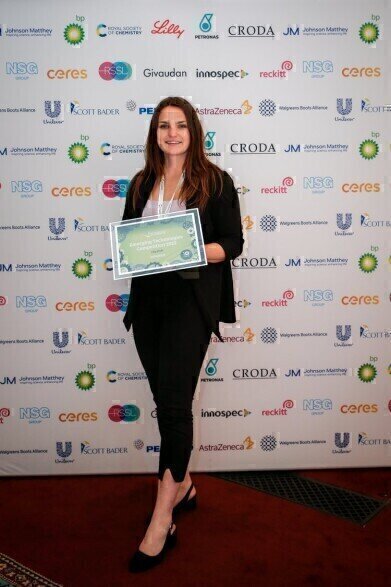-
.jpg) MetalloBio wins The Royal Society of Chemistry Emerging Technologies Award Competition –Health Category, July 2022. CEO Kirsty Smitten receives the award at the RSC presentation (Credit RSC)
MetalloBio wins The Royal Society of Chemistry Emerging Technologies Award Competition –Health Category, July 2022. CEO Kirsty Smitten receives the award at the RSC presentation (Credit RSC) -
 MetalloBio wins The Royal Society of Chemistry Emerging Technologies Award Competition –Health Category, July 2022. CEO Kirsty Smitten receives the award at the RSC presentation (Credit RSC)
MetalloBio wins The Royal Society of Chemistry Emerging Technologies Award Competition –Health Category, July 2022. CEO Kirsty Smitten receives the award at the RSC presentation (Credit RSC) -
.jpg) Lorna Anguilano CSO Phyona
Lorna Anguilano CSO Phyona
News & Views
Women in Innovation Awards 2022/23
Mar 22 2023
In a highly competitive process 50 women entrepreneurs have been selected to benefit from bespoke business boosting support package between April 2023 and March 2024. The support package from UKRI Innovate UK KTN provides a cash injection of £50,000 each, tailored business coaching, mentoring and a wealth of networking, role modelling and training opportunities to help scale their innovations further.
The awards coincided with International Women’s Day (8 March), and reflected the government’s ambition to give more support to women innovators and business leaders. Winners included:
Kirsty Smitten a Forbes 30 Under 30 and The University of Sheffield’s Turner Prize awardee striving to advance a new game-changing class of antibiotics to prevent and treat bacterial infection with her company MetalloBio. “Antimicrobial Resistance is currently responsible for 1.2 million annual fatalities and failure to address the issue by 2050 could result in 10 million deaths costing the global economy £66 trillion. Current antibiotics are failing and the World Health Organisation has highlighted a need for novel antimicrobial therapies. I wanted to put my research to good use and make a difference in this area.”
Kirsty sees the Innovate UK Women in Innovation Programme as a fundamental step in her development as a CEO. She is looking to learn from other women innovators, to improve her delegation skills, and gain insight into pitching and fundraising strategies. Her ultimate goal is to drive MetalloBio to become a world-leading company in the fight against Antimicrobial Resistance, with the aim of saving lives.
Lorna Anguilano, is co-founder and Chief Scientific Officer of Phyona, a company focused on harvesting valuable metals from contaminated soil. From her studies of Earth Science at the University of Milan, Lorna progressed on to a PhD at University College London. Then, at Brunel University, London she established her research passion in material recovery and waste stream upcycling and created a commercial application for her research. The company uses native plants to extract valuable metals from soil contaminated by activities such as mining and which also improve the quality of the soil.
“Researching technology and developing innovations to solve global challenges is also a way to bring experiences and expertise together. It improves the quality of our lives and increases respect for our planet,” said Lorna.
With plans to take the technology and business as far forward as possible, she also commented on her own experience of launching a commercial enterprise: “The biggest barrier to overcome is the fear to enter and be comfortable in a men dominated sector such as engineering. I believe we (as women) are our biggest enemies and fear stops us from standing up and trying.”
Clare Trant, is co-founder and CEO of Untap, specialising in Early Viral Detection and Reduced Transmission in the Workplace. The company’s technology is able to detect viruses in wastewater before symptoms present themselves.The approach also bypasses the need for expensive individual testing.
Wastewater surveillance is used to detect infectious diseases, to understand community prevalence and to identify rising and falling case rates. Using PCR technology, wastewater surveillance can achieve 96% positive detection rates (sensitive) and 100% negative detection rates (specific). Unlike blood or saliva tests, where individuals must give time and submit to invasive testing procedures, wastewater monitoring is 100% passive, and the data is already anonymised
The device can be used in many areas such as schools, offices, hospitals, care homes and prisons and elsewhere. “Our platform is virus agnostic,” said Claire. “In the future we plan to move into other pathogen detection such as bacteria and hormones, MRSA and stress.
Claire sees the Innovate UK Women in Innovation Award as an important step in this development. She also hopes it will help inspire more women to get involved in STEM subjects. “Although sewage technology may not seem particularly appealing, I want to encourage more women to seek out these less appealing but fascinating territories.”
Susan Kelly, co-founder of Respiratory Analytics, designed an AI-led respiratory device, aflo™, for those with asthma, after witnessing her partner and two children being hospitalised due to life-threatening asthma attacks. Almost 90% of sufferers do not master the right technique to get the best benefit from their inhalers and the device aims to do this automatically.
aflo uses AI, sensor tech and big data to help control life-threatening symptoms for people with asthma, COPD and cystic fibrosis. Supported by funding from Innovate UK, Techstart NI and CoFund, the company is designing and building the next generation 'smart inhaler' that will teach users how to inhale medicines correctly and aggregate personal data with air quality and viral data to help identify symptom worsening and warn of possible exacerbation risk.
More information online.
Digital Edition
ILM 49.5 July
July 2024
Chromatography Articles - Understanding PFAS: Analysis and Implications Mass Spectrometry & Spectroscopy Articles - MS detection of Alzheimer’s blood-based biomarkers LIMS - Essent...
View all digital editions
Events
Jul 28 2024 San Diego, CA USA
Jul 30 2024 Jakarta, Indonesia
Jul 31 2024 Chengdu, China
ACS National Meeting - Fall 2024
Aug 18 2024 Denver, CO, USA
Aug 25 2024 Copenhagen, Denmark

.jpg)

24_06.jpg)













